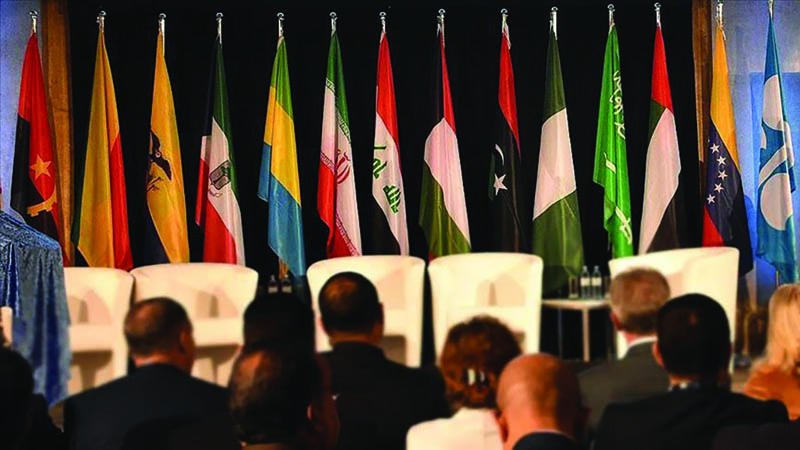 RIYADH: OPEC leader Saudi Arabia and Russia have made a fragile oil alliance work during the pandemic, but their marriage of convenience could be undone as a rebounding market dredges up old tensions, analysts said.
RIYADH: OPEC leader Saudi Arabia and Russia have made a fragile oil alliance work during the pandemic, but their marriage of convenience could be undone as a rebounding market dredges up old tensions, analysts said.LONDON: The 13 members of OPEC and 10 other oil-producing countries, including Russia, said Tuesday they would stick to an agreement for progressive production increases over three months from May given current stable prices and upbeat demand forecasts. "We have examined the market situation and again have confirmed the decisions which were taken a month ago," Alexander Novak, the Russian deputy prime minister whose portfolio includes energy, told Rossiya 24 television following a ministerial meeting, confirming a decision the market had priced in.
"Market prices are currently more or less stable," he added. "We hope this trend continues through to year's end." At its previous meeting at the start of April the alliance had decided to increase production by 350,000 barrels per day in May, as much again in June and then by an additional 450,000 bpd in July.
The Organization of the Petroleum Exporting Countries (OPEC) said the members of the OPEC+ alliance, formed in 2016, had agreed on the progressive increase in highlighting what it termed the importance of rebalancing the global oil market following last year's downward adjustment of output as a result of the COVID-19 pandemic. Alliance members are currently leaving around seven million barrels of potential output a day in the ground in order not to flood a market struggling with the economic fallout of the pandemic.
The alliance, which accounts for approximately a third of global oil production, announced it would meet again in June to review output for July and August. It noted ongoing concerns over rising COVID-19 cases not least in India, which before the virus hit was consuming more than five million bpd, third only to the US and China, according to BP data.
Russia and OPEC leader Saudi Arabia have made a fragile oil alliance work during the pandemic, but their marriage of convenience could be undone as a rebounding market dredges up old tensions, analysts said. The 13 members of the Organization of the Petroleum Exporting Countries (OPEC) and 10 other oil-producing countries, including Russia, formed the OPEC+ alliance in 2016 as a response to rapidly growing competition from the US as well as falling crude prices.
The group drastically cut productions in the face of sluggish demand when COVID-19 turned into a pandemic last year, a move aimed at raising prices. But as prices have returned to pre-pandemic levels hovering around $65 per barrel in recent months, OPEC+ has slowly increased output. In a sign of lingering differences, Russia and Kazakhstan were allowed to raise their output between January and April while Saudi Arabia has voluntarily cut its daily production.
Despite successfully coordinating policy and output of crude for nearly five years, "a rupture can never be ruled out", said Philippe Sebille-Lopez, director of Geopolia and an independent analyst focusing on OPEC and its allies. Three members-Venezuela, Iran and Libya-have been exempt from quotas, while Moscow has been pushing to increase supply for months, putting it at loggerheads with Riyadh, which supports a more timid approach.
Riyadh and Moscow "remain competitors, especially on the Asian market", said Sebille-Lopez. While the US is the world's largest oil producer, Russia ranks second, followed by Saudi Arabia. "What started as a marriage of convenience has turned into a long-term relationship," PVM analyst Tamas Varga told AFP, agreeing with other analysts that the ties are stronger the lower the prices are. Now, however, cuts to output are harder to justify as demand has surged and oil prices have returned to pre-pandemic levels, with predictions from Goldman Sachs they will rise above $80 in the coming months.
To balance its budget, Russia aims for a selling price of $42 to $45, while Saudi Arabia, despite lower production costs, is eager to drive prices up to $70 per barrel. "Russia would like to produce more, while Saudi Arabia, at each meeting, persists in maintaining stricter quotas," Balboni says. Saudi Arabia has volunteered to cut its own output by one million barrels per day (bpd) to help avoid oversupplying the market.
'Remarkable' coordination
The Saudi-Russia price struggle resulted in a falling out during the last OPEC+ ministerial summit that was held in person in Vienna on March 6, 2020, when world crude storage capacity levels were threatened with cheap oil, compounding the effects of the pandemic. Though a fragile truce has since returned to the alliance, Alexey Gromov, in charge of energy at the Institute for Energy and Finance in Moscow, said Saudi Arabia and Russia now "occupy almost identical positions within OPEC+, which can periodically lead to misunderstandings or to a certain tension." - AFP










